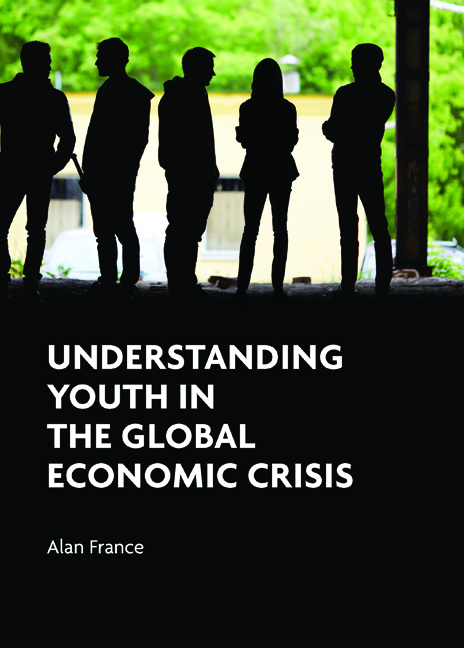Book contents
- Frontmatter
- Dedication
- Contents
- List of tables and figures
- About the author
- Acknowledgements
- Introduction
- One A political ecology of youth
- Two The global crisis and the ‘age of austerity’
- Three Education and training: the broken promise
- Four Education and training: from public good to private responsibility
- Five Unemployment and work: precarious futures
- Six NEETs and the disengaged: the ‘new’ youth problem
- Seven Divergence and difference: contrasting cross-national experiences of being young
- Eight Education, work and welfare in diverse settings
- Nine Youth and mobility: inequality, leaving home and the question of youth migration
- Ten After the crisis: social change and what it means to be young
- References
- Index
Ten - After the crisis: social change and what it means to be young
Published online by Cambridge University Press: 01 September 2022
- Frontmatter
- Dedication
- Contents
- List of tables and figures
- About the author
- Acknowledgements
- Introduction
- One A political ecology of youth
- Two The global crisis and the ‘age of austerity’
- Three Education and training: the broken promise
- Four Education and training: from public good to private responsibility
- Five Unemployment and work: precarious futures
- Six NEETs and the disengaged: the ‘new’ youth problem
- Seven Divergence and difference: contrasting cross-national experiences of being young
- Eight Education, work and welfare in diverse settings
- Nine Youth and mobility: inequality, leaving home and the question of youth migration
- Ten After the crisis: social change and what it means to be young
- References
- Index
Summary
This book emerged out of an interest in filling a ‘gap’ in youth sociology. As outlined in Chapter One, while there has recently been significant attention to the concept of youth agency, there has been less systematic focus on the concepts of ‘structures’ and the ‘structuring processes’ that create the environment that young people have to manage today. By drawing on eight case study countries in the advanced economies, we have explored the current political ecological context for young people aged 16 to 24. For these young people, the post-school field of practice is structured by the interplay of specific local, national and international activities that have embedded within them cultural norms and understandings of ‘the rules of the game’ regarding how life should be organised (Bourdieu, 1993a). Within this environment a number of subfields operate separately but must be seen in relation to each other, constructing the pathways that are available to young people (France et al, 2012). For this age group, work, training, education and the social welfare system are core institutional aspects of life, and bring with them their own structural arrangements. A range of processes and practices then operate at the macro, meso, exo and micro levels to influence the everyday social life of the young. As I have suggested throughout the discussion, to understand the social and political processes that underpin developments in these areas, we need to recognise the role of youth policy and capital, and the relationship between the two. The activities of the state, corporations and private sector business all shape young people's post-school experience (Ball, 2008).
This book has shown that the field of education, training, work and welfare for those young people who leave compulsory schooling has undergone significant changes over the past thirty years, which have been further accelerated as a result of the global crisis in 2007 and the expansion of a range of austerity measures that followed. What is evident is that not all of the changes discussed in this book can be attributed to the crisis or austerity alone, although what can be claimed is that both of these have accelerated processes that have been in place for a number of years.
- Type
- Chapter
- Information
- Understanding Youth in the Global Economic Crisis , pp. 245 - 254Publisher: Bristol University PressPrint publication year: 2016



